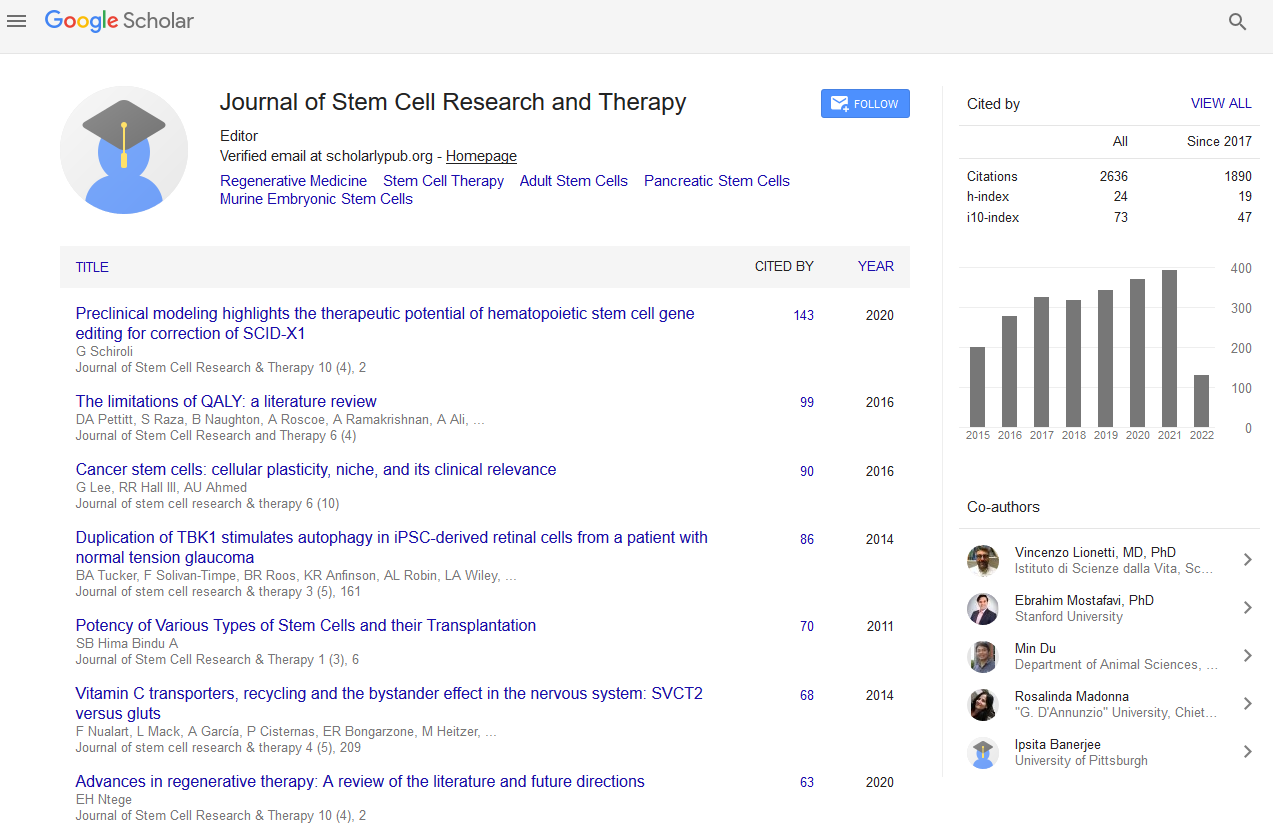Indexed In
- Open J Gate
- Genamics JournalSeek
- Academic Keys
- JournalTOCs
- China National Knowledge Infrastructure (CNKI)
- Ulrich's Periodicals Directory
- RefSeek
- Hamdard University
- EBSCO A-Z
- Directory of Abstract Indexing for Journals
- OCLC- WorldCat
- Publons
- Geneva Foundation for Medical Education and Research
- Euro Pub
- Google Scholar
Useful Links
Share This Page
Journal Flyer

Open Access Journals
- Agri and Aquaculture
- Biochemistry
- Bioinformatics & Systems Biology
- Business & Management
- Chemistry
- Clinical Sciences
- Engineering
- Food & Nutrition
- General Science
- Genetics & Molecular Biology
- Immunology & Microbiology
- Medical Sciences
- Neuroscience & Psychology
- Nursing & Health Care
- Pharmaceutical Sciences
Enabling tools for gene therapy viral vector development
6th International Conference and Exhibition on Cell and Gene Therapy
March 27-28, 2017 Madrid, Spain
Ana Sofia Coroadinha
iBET - Instituto de Biologia Experimental e Tecnológica, Portugal
Scientific Tracks Abstracts: J Stem Cell Res Ther
Abstract:
Virus-Based Biopharmaceuticals (VBBs) produced in animal cells such as oncolytic vectors, virus-like particle vaccines and gene transfer vectors are among the most promising bioproducts. Gene therapy viral vectors interest and investment has grown significantly leveraged by, the recent approvals of gene therapeutic products Glybera and Strimvelis and by the very encouraging results obtained with Chimeric Antigen Receptor (CAR)-T cells in cancer treatments. For the successful marketing of gene therapy, viral vectors enhanced and competitive manufacturing processes are required. On the other hand VBBs development can be cumbersome. The establishment of cell lines for virus production is an intensive and time consuming work. In addition, virus titration methods are laborious and often lack accuracy. In our research, we are developing novel enabling technologies that contribute for the progress in viral vector and cell line development. Different approaches can be used in cell line development. We have been using targeted integration and recently developed a high throughput cell line screening technology, the Single-Step Cloning Screening technology (SSCS). The SSCS merges cloning and screening by using split-GFP, a green fluorescent protein separated into 2 fragments which fluoresce upon transcomplementation. It can be used in cell line development, cell engineering as well as in vector engineering. We could obtain retroviral vector clones producing 1x108 infectious particles per mL and improved IP/TP ratios. To further expand SSCS approach to other virus and in order to quantify virus we are developing Visensors. The latter are cell based biosensors for label-free virus. Herein we will present and discuss these novel technologies which face the state of the art methodologies and how they can contribute for faster development of viral vectors for gene therapy.
Biography :
Ana Sofia Coroadinha has a Degree in Biochemistry and completed her PhD in Gene Therapy in a tripartite felowship between Généthon, Helmholtz Centre for Infection Research (HZI) and iBET. She became Director of the Cell Line Development and Molecular Biotechnology Laboratory (iBET and ITQB-UNL). Her research is focused on developing virus based biopharmaceuticals for vaccine and gene therapy purposes. She has published more than 40 papers in reputed journals and has been serving as an Editorial Board Member of reputed Biotechnology Letters and Scientific Reports journals.
Email: avalente@itqb.unl.pt


